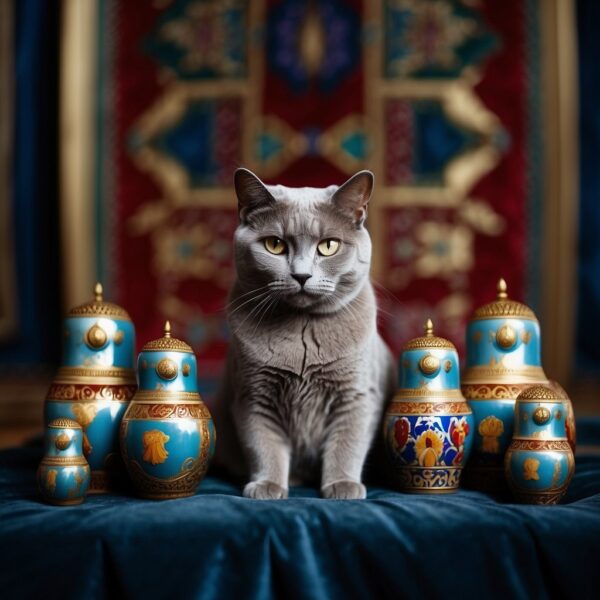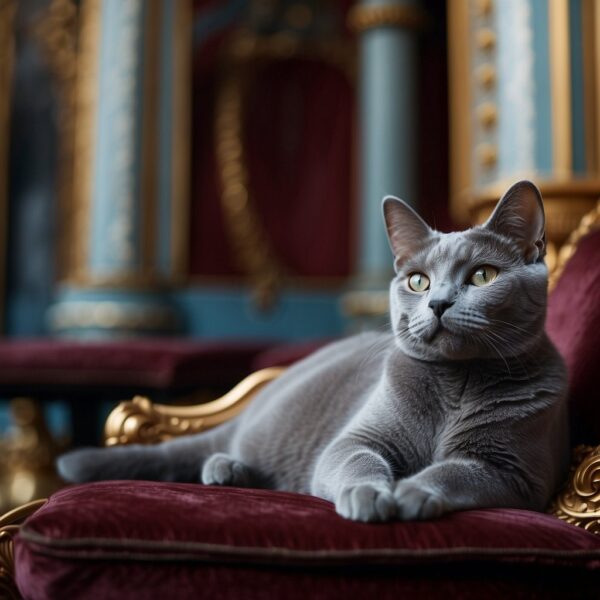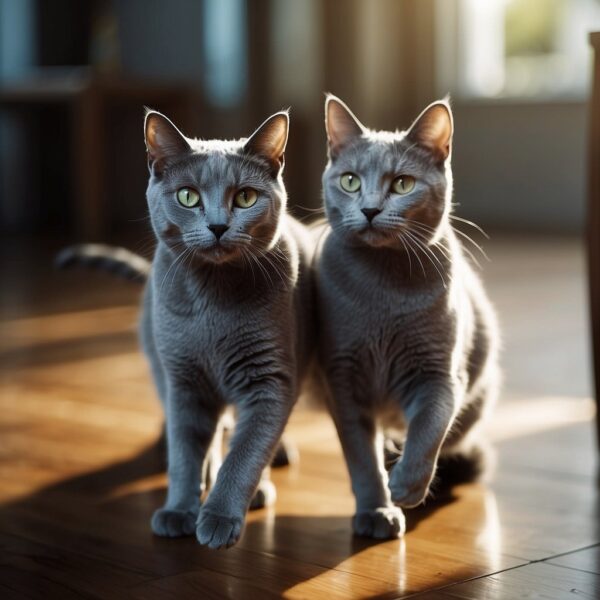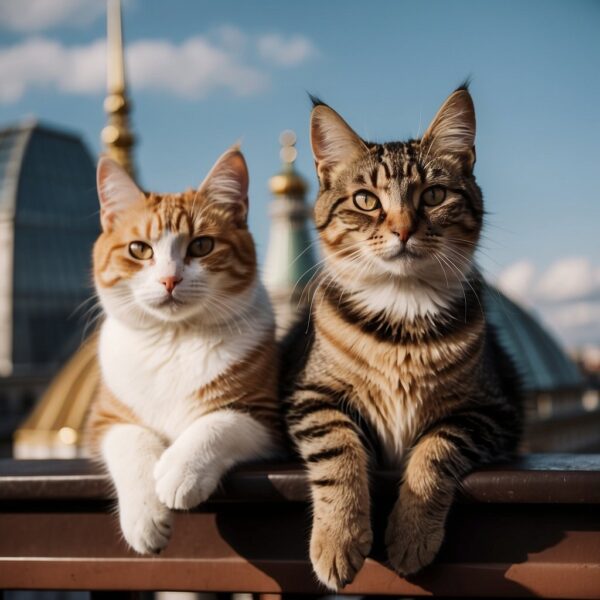
Russian Names for Cats: Connection to History
Russian cat names offer a touch of the exotic and a deep connection to the rich cultural and historical tapestry of Russia. With a language of expressive sounds and meaningful etymology, Russian cat names can add a sense of mystique or tradition to your cat’s identity. Often inspired by Russian geography, culture, and even folklore, these names are as varied and intriguing as the landscape of the country itself—from the bustling city of Moscow to the serene landscapes of Siberia. Choosing a Russian name for your cat might also reflect the lineage of certain distinctive breeds, such as the majestic Siberian or the silvery Russian Blue.
Selecting a Russian name for your feline companion is not merely a trend but can also be a nod to the historical significance and stories behind the names. Researching popular Russian names and their origins is not only a fun activity for a new cat parent but also an informative journey through Russian heritage. The names can correspond with a cat’s character traits, physical attributes, or simply be a personal preference that resonates with the parent. Furthermore, modern trends have seen a rise in the variety of names being adapted to suit the personalities of these beloved household pets.
Key Takeaways
- Russian cat names provide a connection to Russian history, culture, and geography.
- The selection process for these names can be influenced by a cat’s traits parent’s preference.
- There is a growing trend in adapting a variety of Russian names for cats, reflecting both traditional and contemporary influences.
Historical Significance of Russian Cat Names
Russian cat names often embody the nation’s rich history and cultural legacy. They serve as a homage to significant historical figures and reflect the cultural practices and the deeply rooted heritage of Russia.
Cultural Influence
Anatoly, Igor, and Vladislav exemplify the cultural depth of Russian names. These names are not only common among people but also resonate with the grandeur and traditional essence of Russia when given to cats. Anatoly pays tribute to the east, reflecting the vastness of the Russian territory, while Igor echoes the name of a valiant prince known from the epic “The Tale of Igor’s Campaign.” Vladislav, meaning ‘to rule with glory,’ often reminds one of the grand dukes and leaders crowned throughout Russian history.
Famous Historical Figures
In terms of figures from Russia’s past, names like Mikhail, Boris, and Valentin bear significant weight and historical context when chosen for feline companions. Mikhail, drawing from the archangel Michael, suggests a protector and is linked to Mikhail Gorbachev, the last leader of the Soviet Union. Boris, reminiscent of Boris Godunov, a tsar known for his complex reign, adds a touch of regal intrigue to a cat’s persona. Valentin, associated with Valentin Serov, a notable Russian painter, imparts an artistic flair.
Cats named after Vladimir, embracing the influential grandeur of figures like Vladimir the Great and Vladimir Lenin, carry a name heavy with the echo of leadership and transformational change in Russia’s narrative. This connection infuses a sense of historic pride and remembrance in the simple act of naming a cat.

Selecting a Russian Cat Name
When choosing a Russian name for a cat, guardians should consider the cat’s personality, understand the meanings behind names, and take into account sounds and pronunciation for clarity.
Considering Cat’s Personality
A cat with a bold and daring disposition may embody the name Ivan, which signifies “God is gracious.” For a playful feline, Mila, meaning “dear” or “gracious,” could be fitting, highlighting her endearing nature. Conversely, a more serene and graceful cat might suit Irina, symbolizing “peace.”
Understanding Name Meanings
Grasping the significance behind names can add depth to the naming process. Lena, a derivative of Helena, implies “bright one,” a suitable choice for a cat with a vibrant and energetic spirit. Tasha, diminutively rooted from Natasha, carries the meaning of “birthday of the Lord,” which might suit a cat born around festive seasons or with a regal bearing.
Sounds and Pronunciation
A name should be easy to pronounce and call out. Ash fits this criterion while providing a nod to the distinctive blue-grey coat of the Russian Blue breed. Stas, a short form of Stanislav, is both succinct and impactful for a cat with a strong presence. Selecting names with clear sounds ensure they are recognizable to the cat and roll off the tongue effortlessly.

Popular Russian Cat Names and Their Origins
Russian cat names often reflect the country’s rich cultural heritage and language. These names can denote various attributes from a cat’s appearance to historical and literary figures, carrying with them a sense of tradition and familiarity.
Male Russian Cat Names
Ivan is a classic Russian name meaning “God is gracious.” It’s as common in Russia as John is in the English-speaking world and emanates a timeless appeal. Mikhail, Russian for “who is like God,” is not only popular among people but also a distinguished choice for male cats, reflecting strength and classic charm.
Boris, meaning “fighter” or “warrior,” suits a robust or determined cat. The name Viktor with a “k,” translating to “conqueror” or “victor,” can be apt for a winning personality. Dmitry, deriving from Demeter, the goddess of agriculture, carries ancient ties and might fit a cat who loves to “work” in the garden.
Igor, evoking images of grand dukes and noble warriors, means “warrior of peace.” Sergei is synonymous with “protector,” and could be well-suited for a watchful feline. Anton, meaning “priceless,” might be reserved for a cat that holds immense value to their parent.
For cats with spirited and lively characteristics, the name Egor, a Russian derivative of George meaning “farmer,” or Viktor, symbolizing victory, are both suitable and widely embraced options in Russian naming conventions.
| Male Names | Meanings |
|---|---|
| Ivan | God is gracious |
| Mikhail | Who is like God |
| Boris | Fighter, warrior |
| Viktor | Conqueror, victor |
| Dmitry | Follower of Demeter |
| Igor | Warrior of peace |
| Sergei | Protector |
| Anton | Priceless |
| Egor | Farmer |
Female Russian Cat Names
Anastasia, meaning “resurrection,” is not only historically significant but also a sophisticated choice for a female cat, perhaps one with a regal demeanor. The melodic Alina, symbolizing “beautiful,” suits an elegant and graceful cat.
For a cat with a warm personality, Elena, which means “bright, shining light,” would be an appropriate name. Anya, short for “Anna” and meaning “gracious,” might befit a kind and gentle feline companion. Galina, meaning “calm,” is well-suited for a serene and tranquil cat.
Svetlana, translating to “light,” evokes the image of a cat with a luminous and bright nature. Meanwhile, Olga, with its roots in “holy,” could represent a cat with a venerable and staid character.
The following table provides an overview of selected popular female Russian cat names and their meanings:
| Female Names | Meanings |
|---|---|
| Anastasia | Resurrection |
| Alina | Beautiful |
| Elena | Bright, shining light |
| Anya | Gracious |
| Galina | Calm |
| Svetlana | Light |
| Olga | Holy |
Each of these names tells a story and captures a facet of Russian culture, providing a meaningful moniker for a treasured feline friend.

Russian Names Inspired by Locations and Nature
Russian cat names often draw from the nation’s vast and varied environments, reflecting both the majesty of its landscapes and the deep cultural heritage. Siberian influences and regional landmarks are particularly prominent sources for these names.
Siberian Influences
Siberia’s expansive territory is home to the Siberian cat breed, known for its majestic appearance and endurance. Drawing from this, one might name a cat Taiga, after the sprawling Siberian forests, or Baikal, honoring the world’s deepest and oldest freshwater lake. For a Kurilian Bobtail, hailing from the Russian Far East, a fitting name could be Kamchatka, after the peninsula known for its volcanic activity.
Regional Landmarks
Russian geography is dotted with landmarks imbued with historical and natural significance. For example:
- Ural, named after the prominent mountain range dividing Europe and Asia, could befit a robust and adventurous feline.
- Kazan, after the capital of Tatarstan, would suit a cat with a stately demeanor.
These names reflect not just geography but the essence of the places they represent, adding a layer of meaning to the pet’s identity.
Naming Customs and Traditions
In Russian culture, the naming of cats is both an art and a reflection of one’s affinity for the animal. This cultural practice encompasses a range of inspirations from Russia’s vast heritage.
Importance of Patronymics
Patronymics, derived from the father’s name, play a significant role in Russian nomenclature, extending even to pet naming customs. While this practice is more commonly associated with naming people, cats, especially those from Russian cat breeds, are sometimes given elaborate names that can include patronymic-like elements. This highlights the pet’s valued position within a household.
For instance, a male cat might be named Ivan, and if bestowed with a patronymic-style name, it could become Ivanovich, indicating a sense of lineage and respect typical of Russian traditions. Similarly, a female cat named Irina might be affectionately called Irinovna. This adds a layer of personality and familial connection to the pet’s name, echoing Russian cultural depth.
Names like Anastasia or Valentin showcase the Russian propensity for full, melodious names, extending to their pets to denote dignity and beauty. These names are not just labels; they encapsulate the cat’s essence and the affection borne by their human companions.
In the realm of Russian cat breeds, names can carry even greater significance. Breeds such as the Siberian, with its origins steeped in Russian folklore and tradition, frequently carry names that honor their heritage. A Siberian cat might be given a name like Stas, a diminutive of Stanislav, to embody the robust and hearty spirit of their homeland.
Furthermore, the color and markings of a cat can influence its name. A grey cat could be named Ash, consonant with its coat, while another with a golden hue might be named Igor, evoking images of treasure and value in Russian culture.
Overall, Russian cat names, whether influenced by Russian names, patronymics, or the distinctive features of Russian cat breeds, reflect an intricate tapestry of culture, history, and the unique character of each feline.
Modern Trends in Russian Cat Names
As Russian cat naming conventions evolve, they increasingly reflect popular culture influences and contemporary linguistic patterns. Cat parents are selecting names that embody both traditional roots and modern Russian life.
Influence of Popular Culture
Popular culture significantly impacts the naming of cats in Russia. Characters from literature, film, and politics can inspire Russian cat names, offering a homage to well-known figures and stories. For example, names like Natasha, drawn from iconic Russian literature, or Misha, a bear cub which can also be a nod to the 1980 Moscow Olympics mascot, showcase how pop culture retains a strong presence in cat naming. Names such as Vladimir evoke historical significance while remaining prevalent today, conveying the parent’s affinity for cultural or political significance.
Contemporary Names
In today’s Russia, cat names are frequently inspired by contemporary trends and the sound and meaning of the name in the Russian language. Modern Russian cat names often embody concise and catchy phonetics combined with favorable meanings. For instance, Aria is a name that exudes a musical and light-hearted tone, becoming a popular choice for cat parents. Similarly, names like Dasha and Sasha provide a friendly and approachable touch with their soft endings, echoing current preferences for names that are both easy to pronounce and endearing.
The use of diminutive forms has also gained traction, with names like Nikolai often shortened to Kolya which feels more personable and casual. Lana is another trendy choice that lends a modern yet timeless appeal. Additionally, names such as Pyotr and Konstantin have seen a resurgence, merging the appeal of traditional Slavic origins with the fresh wave of nationalism.
Russian cat parents continue to choose names like Misha for its familiarity and affectionate connotations, while Vladimir and Konstantin resurge as names that carry historical gravitas mixed with contemporary relevance.

Frequently Asked Questions
Choosing a Russian name for your cat can be a delightful nod to their heritage, breed, or your personal taste in names. Below are answers to some common inquiries related to Russian cat names, ensuring you find the perfect moniker for your feline friend.
What are some popular names for Russian cat breeds?
For breeds like the Siberian cat or Russian Blue, some popular names include Boris, Igor, Olga, and Svetlana. These names are often chosen for their traditional Russian feel and connection to the cat’s breed origin.
How do I choose a name for a Russian male cat?
When selecting a name for a Russian male cat, consider names that reflect masculine qualities or Russian historical figures such as Mikhail (after Mikhail Baryshnikov) or Yuri (after Yuri Gagarin). It’s also popular to choose names that end in a strong consonant like Maxim or Dimitri.
What are some charming name ideas for a Russian female cat?
For a Russian female cat, one might choose names like Anastasia, Ekaterina, or Natalya which are traditional and exude a sense of elegance. Another approach is to pick names that end in ‘a’ or ‘ya,’ which are common for feminine names in Russia, such as Darya or Sonya.
What are some unique Russian-inspired names for grey cats?
For grey cats, drawing inspiration from Russian words related to their coat color could lead to names like Serebro (silver) or Tuman (mist). Alternatively, you might consider names of Russian cities or regions with wintry associations like Siberia or Moskva (Moscow).
Can you suggest some Russian cat names that have charming meanings?
Surely, look for names with delightful meanings such as Nadezhda (hope), Lyubov (love), or Miroslav (peaceful glory). Other meaningful names might include Zarya (dawn) or Vesna (spring), which represent new beginnings.
What are some notable names given to famous cats in Russia?
Famous Russian cats or cats in literature might inspire names such as Murka, which is a common name for cats in Russia, or Behemoth, the name of the demonic black cat from Mikhail Bulgakov’s “The Master and Margarita.” Other notable names could include Rasputin or Pushkin, after prominent historical figures.